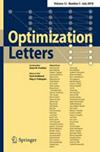组合搜索中的合作
IF 1.1
4区 数学
Q2 MATHEMATICS, APPLIED
引用次数: 0
摘要
在 "组合搜索"(Combinatorial Search)基本问题的博弈论方法中,对手会想到一个 n 元素池 X 中的缺陷元素 d,而提问者需要通过对 X 的某些子集 Q 提出 is\(d\in Q?\) 类型的问题来找到 x。我们考虑了不同的模型,这些模型的不同之处在于如何决定由谁来提出下一个问题、由谁来获得问题的答案以及由谁来在过程结束时知道有缺陷的元素。本文章由计算机程序翻译,如有差异,请以英文原文为准。
Cooperation in combinatorial search
In the game theoretical approach of the basic problem in Combinatorial Search an adversary thinks of a defective element d of an n-element pool X, and the questioner needs to find x by asking questions of type is \(d\in Q?\) for certain subsets Q of X. We study cooperative versions of this problem, where there are multiple questioners, but not all of them learn the answer to the queries. We consider various models that differ in how it is decided who gets to ask the next query, who obtains the answer to the query, and who needs to know the defective element by the end of the process.
求助全文
通过发布文献求助,成功后即可免费获取论文全文。
去求助
来源期刊

Optimization Letters
管理科学-应用数学
CiteScore
3.40
自引率
6.20%
发文量
116
审稿时长
9 months
期刊介绍:
Optimization Letters is an international journal covering all aspects of optimization, including theory, algorithms, computational studies, and applications, and providing an outlet for rapid publication of short communications in the field. Originality, significance, quality and clarity are the essential criteria for choosing the material to be published.
Optimization Letters has been expanding in all directions at an astonishing rate during the last few decades. New algorithmic and theoretical techniques have been developed, the diffusion into other disciplines has proceeded at a rapid pace, and our knowledge of all aspects of the field has grown even more profound. At the same time one of the most striking trends in optimization is the constantly increasing interdisciplinary nature of the field.
Optimization Letters aims to communicate in a timely fashion all recent developments in optimization with concise short articles (limited to a total of ten journal pages). Such concise articles will be easily accessible by readers working in any aspects of optimization and wish to be informed of recent developments.
 求助内容:
求助内容: 应助结果提醒方式:
应助结果提醒方式:


